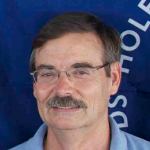Connecting the Global Water Cycle With Climate Change

Senior Scientist
Woods Hole Oceanographic Institution
Woods Hole Oceanographic Institution
Dr. Schmitt earned his Ph.D. in Physical Oceanography from the University of Rhode Island. His research interests include oceanic mixing processes such as "salt fingers" and the oceanic freshwater cycle. Read more about Dr. Schmitt here.
Webinar Clip
Dr. Schmitt talks about the effect climate change will have on the global water cycle and what that means for us. As the Earth warms, it creates an intensification of the water cycle, which means we can expect more extreme weather (e.g., more frequent and severe hurricanes, longer droughts, worsening snowstorms). He also makes connections between a warming climate and ocean surface salinity.Full webinar: Salinity's Connection to Climate Change and an Accelerated Water Cycle
Click here for a transcript of this clip (PDF, 38.7 KB). |
Resources
Applicable Science Standards
 Asking Questions and Defining Problems. A practice of science is to ask and refine questions that lead to descriptions and explanations of how the natural and designed world(s) works and which can be empirically tested.
Asking Questions and Defining Problems. A practice of science is to ask and refine questions that lead to descriptions and explanations of how the natural and designed world(s) works and which can be empirically tested. Engaging in Argument From Evidence. Argumentation is the process by which evidence-based conclusions and solutions are reached. In science and engineering, reasoning and argument based on evidence are essential to identifying the best explanation for a natural phenomenon or the best solution to a design problem.
Engaging in Argument From Evidence. Argumentation is the process by which evidence-based conclusions and solutions are reached. In science and engineering, reasoning and argument based on evidence are essential to identifying the best explanation for a natural phenomenon or the best solution to a design problem.